- Home
- Stephen R. Donaldson
A Dark and Hungry God Arises Page 15
A Dark and Hungry God Arises Read online
Page 15
“In that case,” Len returned in the same vein, “please accept my condolences. Everyone makes mistakes—but not everyone can afford them. Men who hold as much responsibility as we do, Director Lebwohl, must somehow transcend their fallibility. Otherwise their ‘errors’ affect all humankind.
“Members, Director Dios, I think we should consider the issues as they have been presented to us so far, before we go on to other matters. Junior Member Carsin, do you wish to question Director Lebwohl or Director Dios?”
A barrage ensued. Carsin did indeed want to question Hashi; she considered his explanation preposterous. And she was quick: by the time Abrim Len offered her the floor, she’d marshaled a long list of hostile inquiries. After her came the Member for Valdor Industrial, the Senior Member for the PRC, the Junior Member for the Combined Asian Islands and Peninsulas, the Member for New Outreach, and others: all deeply disturbed by the implications of Angus’ escape; all critical of Data Acquisition and Hashi Lebwohl on either procedural or strategic grounds.
At one point Hashi interrupted the bombardment to feign receiving a note from his offscreen aide; reading it, he announced, “Junior Member Carsin, I have the calculations you requested. It appears that Captain Thermopyle has left our solar system for forbidden space. If he does not alter his course, he is headed toward a planetoid called Thanatos Minor, which we believe to be the location of a bootleg shipyard catering to the needs and transactions of pirates.” With a shrug; he added, “A natural destination for a man such as Captain Thermopyle, if I may say so. Our treaties with the Amnion preclude all possibility of pursuit.”
Then he resumed his answers as if he were fielding enemy fire.
He was calm the entire time; unruffled; almost happy. Only the wheeze of his voice betrayed any strain. He was well prepared for the challenge. And he was temperamentally equal to it: he felt no telltale indignation at being pushed to defend lies with more lies. Because he made no necessary distinction between truth and falsehood, he was in his natural element.
Warden should have paid attention, but his mind wandered. The Council’s questions, like Hashi’s answers, were chaff; a way of filling the time until Abrim Len felt ready to broach “other matters.” As a good politician, the president wanted his fellow GCES Members to satisfy their appetite for trivialities before he raised more sensitive issues. The real questions—the real threats—hadn’t begun yet.
As if he wanted reassurance, Warden looked away from the cameras toward Min Donner and Godsen Frik.
Min had no comfort in her. She was too sure. In a sense, she’d been purified by her commitment to her ideals. As her director, Warden could require her to do things she didn’t like; but he had no power to make her question the nature of her beliefs. Despite his impersonal love, as well as his personal respect, he couldn’t get what he wanted from her.
The PR director, on the other hand—
One curse—or blessing—of Warden’s prosthetic eye was that it never closed. He was never blind to the aura and sweat, the respiration and pulse, of the people around him; could never turn off his awareness of Godsen’s hypocrisy. For him, Godsen was the UMCP in miniature. Or rather, he was what the UMCP had become; what the UMCP had been turned into by Dios himself, under pressure from Holt Fasner. Warden couldn’t lose sight of that fact.
Godsen’s emanations consoled him by reminding him that every price he paid was justified; that everything he did to make restitution was worth the risk.
He faced the cameras and the migraine flicker of the screen again as Len began saying, “Thank you, Director Lebwohl. You’ve been most forthcoming. I believe you’ve satisfied those of us who are capable of being satisfied in this difficult situation. And I’m sure the rest”—he didn’t so much as glance at Carsin—“understand the need to contain their dissatisfaction until the Council can resume its emergency session in private.
“Director Dios, do you wish to add anything before we go on?”
Warden shook his head. Steadying himself on his core of anger, he said, “Hashi Lebwohl has my complete confidence. He’s already answered your questions more fully than I could myself.”
Len bowed slightly. “Very well, Director Dios. We will proceed.”
The whole Council seemed to pause as if the broadcast image had frozen. Members held papers motionless in their hands; advisers leaning forward to speak remained still.
The throbbing in Warden’s temples sharpened noticeably.
He wondered how much trepidation his IR vision would have picked up from the president in person as Len said, “You mentioned Angus Thermopyle’s arrest and conviction on Com-Mine Station, As you know, those events have played a large part in the debates of the Council on other occasions.” For instance, in the debate over the Preempt Act. “You may not be aware, however, that certain of our Members have asked questions concerning those events for which we have never obtained satisfactory answers. Angus Thermopyle’s escape gives those questions a new urgency.
“Member Martingale, will you continue?”
Martingale was the Member for Com-Mine Station.
“Director Dios,” she said without raising her eyes from her data terminal, “my constituency was more intimately involved in the Thermopyle case than any other. I’m better placed to ask questions than my fellow members—and my responsibility to Com-Mine Station requires me to ask those questions. At the same time, Com-Mine is anxious”—she stressed the word carefully—“to avoid any taint of personal interest. Our Security has been extensively challenged. We wish to defend ourselves—and yet any self-defense smacks of special pleading.
“Therefore, at my urging, the Governing Council for Earth and Space has appointed a Special Counsel to investigate these matters independently. For the record, I remind my fellow Members that the Special Counsel was chosen without consultation with my office or Com-Mine Station. Director Dios, both my office and Com-Mine Station have been questioned as rigorously as I hope you will be questioned now.”
Warden blinked at the pain of the flickering screen. Here it comes, he thought as Martingale finished, “Let me introduce Special Counsel Maxim Igensard. Special Counsel Igensard, will you take the floor?”
“Thank you, Member Martingale.” The man who spoke left his seat behind the Eastern Union Senior Member and moved to stand at the table.
After a restive moment the Council grew still again.
Muttering silent imprecations against the IR blindness of the downlink, Warden studied Maxim Igensard intensely.
He’d known of Igensard’s appointment for some time, of course. However, the fact that the GCES wanted Igensard to question him and Hashi now should have come as a complete surprise.
Warden wasn’t surprised. He was relieved—so profoundly relieved that for a moment he nearly made the mistake of letting it show.
“Director Dios,” Igensard began. “Director Lebwohl. This is a rare opportunity for me. I hope we’ll be able to shed light on some troubling issues.”
The Special Counsel had a diffident voice which matched his colorless appearance. Although he was the only man in the hall standing, he appeared short. His formal gray suit had been cut—unsuccessfully—to conceal an incongruous potbelly; incongruous because his limbs were slight and his face carried no fat. He looked like a man who could be blown in any direction by the winds of circumstance.
Yet he alone seemed to understand that in order to create the illusion of eye contact with the UMCP director he had to face the cameras rather than the screen. As a result, he was the only person in the chamber who didn’t appear to be scrutinizing Warden’s crotch.
Despite the flicker of the screen, Igensard’s straight gaze showed no diffidence at all.
Warden’s throat tightened in hope or dread. “Ask whatever you want,” he said gruffly. “We’ll answer as well as we can.”
Igensard didn’t hesitate. “As it happens, I don’t know to whom I should address my questions.” He had no notes; apparently he needed none.
“I’ll tell you what I want to know, and you can answer as you see fit.
“Morn Hyland,” he announced as if the subject had no particular significance, “was an ensign aboard the UMCP destroyer Starmaster. When her ship was lost, she came into the hands of Captain Thermopyle. His testimony is on record—he claims to have rescued her after her ship was destroyed, purportedly by Com-Mine Station sabotage.”
To control his own tension, Warden interposed, “Are you going to ask us if Milos Taverner had anything to do with Starmaster’s destruction? We don’t know.”
Igensard continued as if Warden hadn’t spoken. “She remained with him after he returned to Com-Mine Station. He claims she did so because she didn’t trust Com-Mine Security. But when Security arrested him for stealing Station supplies, she immediately left both him and Com-Mine with a Captain Nick Succorso aboard the frigate Captain’s Fancy. Captain Succorso himself has frequently been suspected of illegal activities, but has never been convicted. Is this substantially correct?”
Warden shrugged. “You’ve got the records. You know it is.”
“In that case, Director Dios, Director Lebwohl, all my questions can be summed up in one. Why did you allow this to happen?” The diffidence of Igensard’s voice was a sham; a way of disarming people. “A known illegal is caught and convicted by Com-Mine Station. He is later reqqed by Data Acquisition. At the same time, a UMCP officer, the sole survivor of a UMCP ship, Captain Thermopyle’s only companion—the only witness to what he may have done—is allowed to depart Com-Mine, untouched and unquestioned, again in the company of a known illegal. She is set free, presumably so that she can rejoin Captain Thermopyle—who by some monumental coincidence has just contrived his escape from Data Acquisition.
“Director Dios, Director Lebwohl, this stinks of complicity.” Igensard’s straight stare made Warden forget his potbelly and his shortness. “It stinks of malfeasance. It suggests that Captain Thermopyle is one of your operatives—that his crimes were whitewashed to preserve his life—that he was reqqed from Com-Mine Security so that his interrogation would not succeed—that he was allowed to escape in reward for his services, and in order to serve you further. It suggests that the UMCP is in league with known illegals to subvert Station security, protect illegals, and preserve piracy, all of which work to the aid of the Amnion in their aims against humankind.”
Warden feared that Min was going to come out of her chair and start yelling. Only an iron discipline held her still.
“Before you answer,” Igensard concluded, “let me inform you that I’ve seen Com-Mine Station’s records of the entire affair. They are explicit. Com-Mine Security allowed Ensign Hyland to depart with Captain Succorso on your orders. She was UMCP—outside their jurisdiction. So they contacted UMCPHQ for instructions. Your instructions were to take no action concerning her.
“I ask you again. Why did you allow this to happen?”
Now, Warden thought. This is it. The whole thing stands or falls here.
The sensation of migraine from the screen made him feel that he was going blind in both eyes.
“With respect, Special Counsel Igensard,” he drawled sardonically, “aren’t you being just a bit global about all this? You’re drawing large conclusions from some very small evidence.”
“Just answer the question, Director Dios,” Igensard retorted. “The Governing Council for Earth and Space will draw its own conclusions.”
With a mental lift of his shoulders, Warden Dios trusted his fate to people he couldn’t control; to Hashi Lebwohl, who made no distinction between one fate and another. “This is your department, Hashi,” he said softly. “You’d better answer.”
Hashi had been thoroughly prepared: he squirmed as if he were sweating for his life. For the first time since he’d seated himself on the front of Warden’s desk and faced the cameras, he started to tell the truth.
“Special Counsel Igensard, your concern is misplaced.” Now his voice held a tremor so convincing that Warden almost believed in it. “Again the situation is more complex than you realize.
“Captain Thermopyle is not numbered among Data Acquisition’s few operatives. If you have studied the psy-profiles prepared on him by Com-Mine Security, you will believe me. Such a man—how shall I say this?—is utterly beyond trust. I could not use him as an operative because he would not submit to being used.
“On the other hand, Captain Succorso does serve me upon occasion.
“For the most part, his crimes are putative rather than real. They serve as a smoke screen. Therefore we had no reason to permit Com-Mine Security to interfere in the matter of Ensign Hyland. We had cause to doubt their integrity—and a useful alternative was available to us.”
“Then where is she?” Igensard demanded promptly. “What kind of rescue do you call this? My God, Director Lebwohl, she was in Thermopyle’s hands for weeks. You mentioned his psy-profile. He’s a certifiable psychopath—and she’s a cop. Haven’t you thought about what he must have done to her? Com-Mine Station has hospitals, therapists, neural medicine. What help can Captain Succorso give her? Where did he take her?
“What kind of use are you trying to make out of her?”
“Special Counsel Igensard, you must understand.” The tremor in Hashi’s voice became more pronounced. It made him sound frail; cornered. “Human space is at peace with the Amnion. With considerable difficulty, the United Mining Companies Police strives to maintain this peace. But Data Acquisition is another matter. Data Acquisition is at war. It is a war for facts, for comprehension—for the means by which the Amnion and humankind may be spared overt conflict—but it is a war nonetheless. And in warfare men and women become tools. They must be used for what they can accomplish, without regard to the personal cost.
“Data Acquisition cannot afford to neglect opportunities when they are presented. Ensign Hyland presented me with an opportunity which it would have been malfeasance to ignore.”
Min Donner was on the edge of her seat, listening hard. Godsen Frik chewed his knuckles as if he might bite off his fingers.
“You must recall,” Hashi continued, “that Captain Succorso is universally thought illegal. Therefore he has access to places and powers which no UMCP officer may approach directly. And Ensign Hyland was irretrievably compromised. You ask if we have considered what Captain Thermopyle must have done to her. I tell you that we have considered the harm she has undergone—that we believe Captain Thermopyle’s vileness toward her beggars description—and that in our opinion no hospital or therapy can restore her.
“Therefore”—Hashi took a shuddering breath—“we elected to make use of her in another way.”
“Don’t stop now,” the Special Counsel put in. His tone was incisive enough to draw blood. “You’re painting a fascinating picture of what passes for ethics in UMCPHQ.”
At once Warden snapped, “That’s uncalled for. You aren’t charged with the duty of protecting humankind from the Amnion. We are.”
“Certainly, of course,” Abrim Len interposed, as smooth as oil. “Director Dios, Director Lebwohl, we appreciate the honesty of your answers. Special Counsel Igensard, please refrain from passing judgment on what you hear. That is the responsibility of the Council as a whole, not of any one man or Member.”
Igensard bowed his head momentarily, but didn’t respond.
Council members rearranged their papers or peered at their readouts as if they were embarrassed by the reproach. Some of them watched Igensard and the downlink screen avidly: others appeared to want to move their chairs farther away from the Special Counsel’s position.
“As I say,” Hashi resumed, sounding a bit steadier, “we elected to make use of Ensign Hyland in another way. Again I insist that these matters are complex. Before the case of Captain Thermopyle and Ensign Hyland came to our attention, we were at work preparing an operation for Captain Succorso. I made reference earlier to Thanatos Minor and a bootleg shipyard in forbidden space. That shipyard is beyond our reach, by virtue of its
location. Yet it is accessible to Captain Succorso. Seeking to damage its effectiveness, we—no, I must say I—conceived a way to strike against it through Captain Succorso.
“My plan was to send him to Thanatos Minor armed with a drug which he would claim supplied an immunity to Amnion mutagens.”
Min drew a sharp breath which must have been audible over the broadcast pickups.
“We would provide Captain Succorso with fabricated proofs of the efficacy of this drug. He would sell it to the illegals of Thanatos Minor—who would in turn no doubt sell it to the Amnion. Even the rumor of such a drug would cause them considerable alarm. When the actual uselessness of the drug was discovered, Thanatos Minor would naturally blame Captain Succorso. But many illegals—and perhaps the Amnion themselves—would blame Thanatos Minor. In my opinion, the bootleg shipyard would suffer a loss of credibility from which it might never recover.
“That is my job, Special Counsel Igensard—to do such damage as I can to the forces which weaken us against the Amnion.”
Igensard’s mouth twisted into a sneer. “And what use were you going to get out of Morn Hyland in all this? Were you going to use her as a guinea pig to prove the drug worked?”
“No!” Hashi protested as if the idea horrified him, although the truth was worse. “We gave her to Captain Succorso for his own protection. I have already said that she was irretrievably compromised. And we had already taken steps to protect ourselves from the revelations Captain Thermopyle presumably extorted from her. Yet she was a cop, in your terms. And Captain Succorso, by his very nature, is a man of malleable loyalties.
“We gave Ensign Hyland to him so that he would have something to sell if he were trapped or caught—if he found himself in circumstances which tempted him to expose the falseness of our drug.”
Min Donner sprang to her feet. Radiating outrage, she moved right to the edge of the cameras’ view. Her fists were clenched to strike out. If Warden hadn’t stopped her with a quick glare, she might have jumped at Hashi.

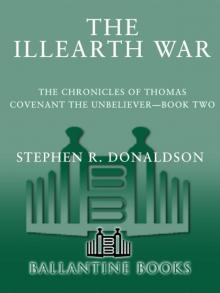 The Illearth War
The Illearth War Last Chronicles of Thomas Covenant 02 - Fatal Revenant
Last Chronicles of Thomas Covenant 02 - Fatal Revenant Lord Foul's Bane
Lord Foul's Bane The Gap Into Ruin: This Day All Gods Die
The Gap Into Ruin: This Day All Gods Die White Gold Wielder
White Gold Wielder Fatal Revenant
Fatal Revenant The Mirror of Her Dreams
The Mirror of Her Dreams Against All Things Ending
Against All Things Ending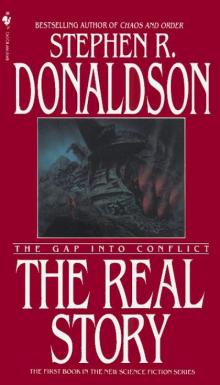 The Real Story: The Gap Into Conflict
The Real Story: The Gap Into Conflict The Power That Preserves
The Power That Preserves Seventh Decimate
Seventh Decimate The Gap Into Power: A Dark and Hungry God Arises
The Gap Into Power: A Dark and Hungry God Arises A Man Rides Through
A Man Rides Through The Gap Into Vision: Forbidden Knowledge
The Gap Into Vision: Forbidden Knowledge The King's Justice: Two Novellas
The King's Justice: Two Novellas The Wounded Land
The Wounded Land The Runes of the Earth
The Runes of the Earth Mordant's Need
Mordant's Need The One Tree
The One Tree Gilden-Fire
Gilden-Fire Reave the Just and Other Tales
Reave the Just and Other Tales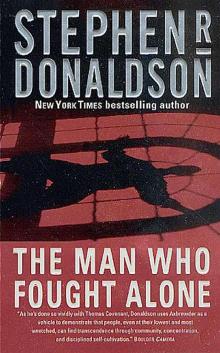 The Man Who Fought Alone
The Man Who Fought Alone The Last Dark
The Last Dark The Man Who Tried to Get Away
The Man Who Tried to Get Away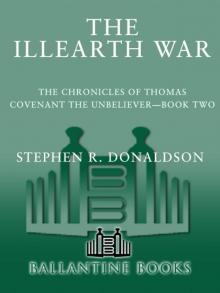 Thomas Covenant 02: The Illearth War
Thomas Covenant 02: The Illearth War A Dark and Hungry God Arises
A Dark and Hungry God Arises The One Tree t2cotc-2
The One Tree t2cotc-2 Lord Foul's Bane cotc-1
Lord Foul's Bane cotc-1 The Illearth War t1cotc-2
The Illearth War t1cotc-2 The Runes of the Earth: The Last Chronicles of Thomas Covenant - Book One
The Runes of the Earth: The Last Chronicles of Thomas Covenant - Book One The King's Justice
The King's Justice White Gold Wielder t2cotc-3
White Gold Wielder t2cotc-3 The Power That Preserves t1cotc-3
The Power That Preserves t1cotc-3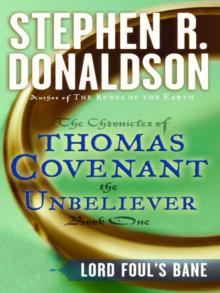 Thomas Covenant 01: Lord Foul's Bane
Thomas Covenant 01: Lord Foul's Bane Chaos and Order: The Gap Into Madness
Chaos and Order: The Gap Into Madness Daughter of Regals
Daughter of Regals Forbidden Knowledge: The Gap Into Vision
Forbidden Knowledge: The Gap Into Vision Fatal Revenant t3cotc-2
Fatal Revenant t3cotc-2 The Runes of the Earth t3cotc-1
The Runes of the Earth t3cotc-1 Thomas Covenant 03: Power That Preserves
Thomas Covenant 03: Power That Preserves This Day all Gods Die: The Gap into Ruin
This Day all Gods Die: The Gap into Ruin The Wounded Land t2cotc-1
The Wounded Land t2cotc-1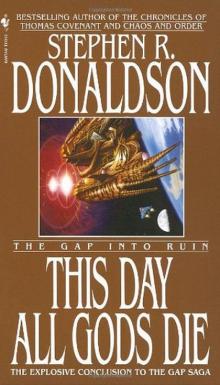 This Day All Gods Die
This Day All Gods Die One Tree
One Tree